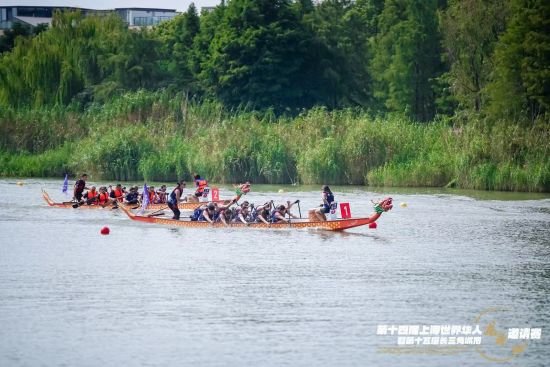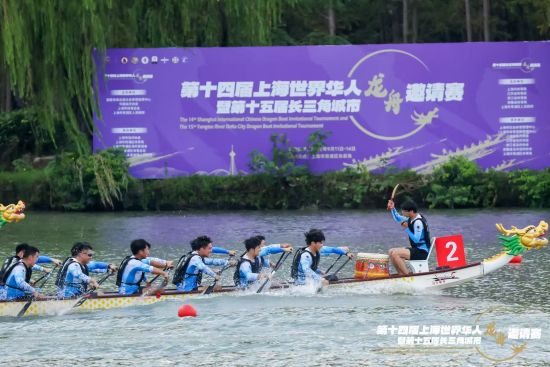Hundreds of oars churned the water as dragon boats raced fiercely. From September 11th to 14th, the 14th Shanghai World Chinese Dragon Boat Invitational and the 15th Yangtze River Delta City Dragon Boat Invitational were grandly held in Zhujiajiao Town, Qingpu District. Twenty-eight teams with 600 athletes from 13 countries and regions gathered in the waterside town of Qingpu. Using boats as a medium and competitions to meet friends, they displayed their heroic prowess as “aquatic dragons” upon the emerald waves, coming together for this annual event that combines competitive passion and cultural exchange.

On the afternoon of September 13th, the opening ceremony was grandly held at Zhujiajiao Town’s Civic Square. The ceremony was full of highlights and rising climaxes. A short video回顾ed the passionate moments of past events, both重温ing the热血岁月 of dragon boat racing and串联ing the rapidly developing landscape of Qingpu New Town; the激昂澎湃 large drum performance “Drums Shake, Lions Leap” was magnificent, its铿锵 drumbeats激荡ing the upward spirit of the Chinese people; the traditional martial art from the Taihu Lake basin, “Jiangnan Boat Boxing,” combined hardness and softness, interpreting the profound depth of waterside culture in every move; the breakdance performance “Extreme Dancing” set the stage on fire with dynamic beats, showcasing youthful style. These diverse cultural and sports performances allowed athletes from around the world to immerse themselves in the charm of traditional Chinese sports culture. The venue erupted with thunderous applause and cheers, pushing the opening ceremony to one climax after another.
This year’s competition was set up professionally and diversely, covering multiple events including the 22-person open dragon boat and 12-person mixed dragon boat 200-meter and 500-meter straight course races. It tested team coordination and showcased the激情碰撞 of speed and strength. At the competition site, flags fluttered along the Dianpu River banks as teams, wearing unified uniforms, boarded the dragon boats in high spirits. At the starting signal, the lined-up dragon boats shot forward like arrows from their strings. Instantly, the lake surface churned with white waves, oars flew in unison, and water splashed everywhere. Team members shouted铿锵 slogans and moved as one; the dragon boats cut through the waves, speeding forward with dragon flags fluttering in the wind. The athletes, united and striving forward, carved moving trajectories against the blue waters and sky, becoming the most inspiring scenery on the Dianpu River.
In the end, the Spanish Chinese Dragon Boat Team and Jiangsu Nantong Ningran Photoelectric Dream Team won first place overall in the 12-person mixed dragon boat and 22-person open dragon boat categories, respectively.
Since its inception in 2009, the Shanghai World Chinese Dragon Boat Invitational has become the only international dragon boat event in China primarily focused on Chinese participants from around the world. After more than a decade of accumulation and growth, it is not only a competitive event but also an important platform for uniting the emotions of global Chinese communities and promoting Chinese culture. For many participating teams, this event has long transcended mere competition, resembling an annual gathering of old friends. Here, there is both the激情碰撞 of rowing and racing waves and the cultural exchange of meeting friends through boats; it showcases the competitive风采 of dragon boat teams from various countries while also carrying cultural recognition that跨越es mountains and seas. The event not only provides a stage for high-level competition but also continues to expand its international influence, attracting dragon boat enthusiasts from around the world to gather in Qingpu. This year, the event deeply integrated for the first time with the Yangtze River Delta City Dragon Boat Invitational. As a key dragon boat IP event in the Yangtze River Delta region, this invitational involves joint participation from Shanghai, Jiangsu, Zhejiang, and Anhui, and has become an important platform for promoting the integrated development of culture, tourism, and sports in the Yangtze River Delta and regional exchange and cooperation. This year, a total of 12 large dragon boat teams with 288 athletes from the three provinces and one city participated.
As the “Hometown of Chinese Dragon Boating,” Qingpu not only boasts abundant water cultural resources but also carries profound ancient civilization底蕴. Here, dragon boat racing is not only a time-honored traditional sport but also a cultural practice deeply integrated into folk life and passed down through generations.





